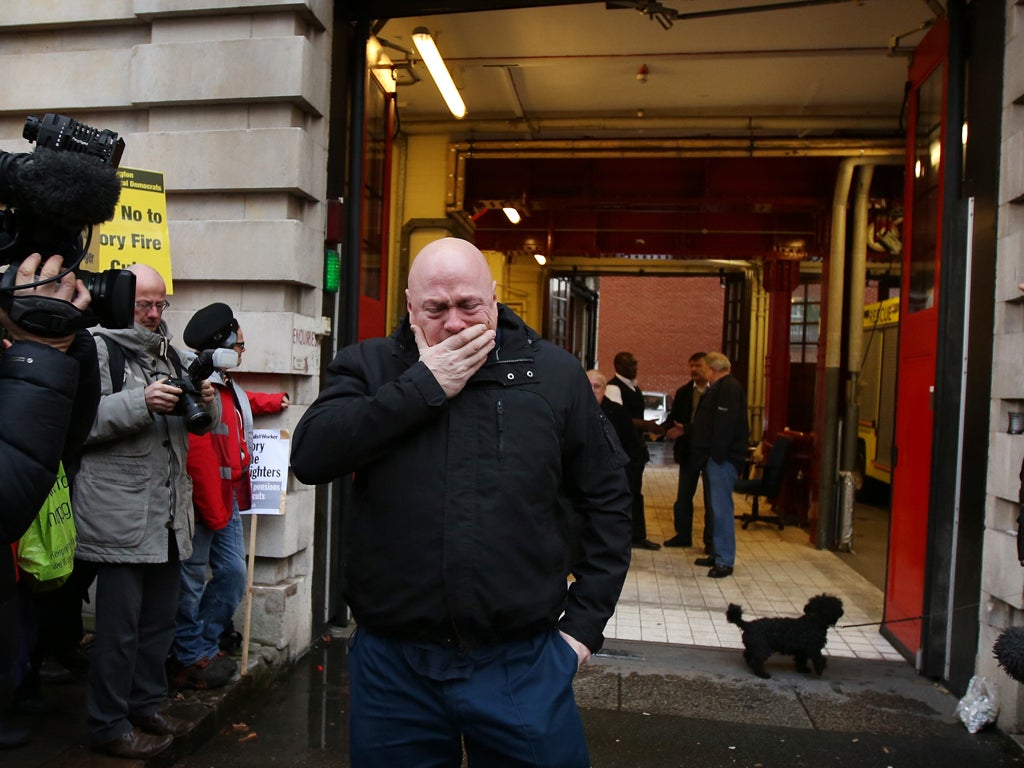Fire stations close across London: Destroying public resources crushes the heart of communities
By extending response times to many areas with these closures, we're sentencing more and more people to suffering an agonising wait for help to turn up


Your support helps us to tell the story
From reproductive rights to climate change to Big Tech, The Independent is on the ground when the story is developing. Whether it's investigating the financials of Elon Musk's pro-Trump PAC or producing our latest documentary, 'The A Word', which shines a light on the American women fighting for reproductive rights, we know how important it is to parse out the facts from the messaging.
At such a critical moment in US history, we need reporters on the ground. Your donation allows us to keep sending journalists to speak to both sides of the story.
The Independent is trusted by Americans across the entire political spectrum. And unlike many other quality news outlets, we choose not to lock Americans out of our reporting and analysis with paywalls. We believe quality journalism should be available to everyone, paid for by those who can afford it.
Your support makes all the difference.There was hardly a dry eye on the windswept streets of North London last Thursday morning as Clerkenwell Fire Station, which was the oldest in Europe, closed. The images of big, burly fire fighters like 30-year-veteran Alex Badcock weeping as they left following their final watch reached far beyond the site.
The station is one of 10 set to be shuttered across London – along with the loss of more than 550 firefighters and 14 fire engines – as London Mayor Boris Johnson looks to slash £45 million off the budget over the next two years.
Seconds count when fighting fires, and this cold-hearted move has left locals in increased danger. I know from my own personal experience what it is like to wait for a fire engine to arrive in a critical emergency situation.
Every second feels like an age. By extending response times to many areas of London with these closures, we're sentencing more and more people to suffering an agonising wait for help to turn up.
While there was understandably an atmosphere of mourning at the closure, what was also evident was the community’s strong resolve to fight to save one of its vital community resources. They want to preserve it as a community asset, so it can be reopened in the future, or at least used for community benefit.
As Leader of The Green Party of England and Wales, the only party committed to fighting unnecessary, ideologically-driven cuts and preserving public resources for current and future use, it was heart-warming to see. It was cheering to see that there are local activists who will continue to fight to keep buildings like Clerkenwell Fire Station from being sold off for development, activists determined to maintain community resources for the common good.
But what we need as well as these individual fights are a concerted campaign against the sell-offs of the family silver that Chancellor George Osborne is proposing as a possibility for every national resources.
The 'right to contest' scheme will allow businesses and individuals to submit a proposal for any of the government’s £330billion worth of land and property. Oh, but don’t worry, says Mr Osborne, we’re not going to sell off the British Museum, we’re just offering it out there.
Well, no, the British Museum might be safe for now, but it’s clear that almost no other public resource is.
The Clerkenwell fire station is a good example. It’s perfectly located for its role – right beside the City of London, ready to dash to any crisis in that densely crowded square mile, whether it be fire in a high rise or terrorist attack, an experience with which the City is all too familiar, on an immensely expensive block of land that it’s hard to imagine the government buying today.
But it was established, generations back, in the right place, as a community resource. The civic fathers and mothers put in the investment for the future, not expecting that their descendants would treat it as a cash cow, to be milked for the present and lost to the future.
For once these facilities are gone, they are gone. I was recently on a walking tour on the political history of London, and we stopped outside Caxton Hall, the site of an early women’s parliament and many other important moments in political history. It’s now been converted into luxury flats.
And what’s been lost is not just all of that history, but an affordable, central London meeting space – something in precious short supply, yet essential to the proper exercise of our democracy.
It’s the same with that library that becomes a supermarket, that Sure Start centre converted into offices, that social housing converted into luxury flats, they were community riches built up over time.
Communities to function properly need a full range of public resources, from fire stations to libraries to community centres. These facilities are their heart, their pressure valves, their lifeblood.
And yet we’re destroying them, selling them off, leaving us at risk – particularly in London – of creating endless deserts of luxury flats, let by investor owners or maintained by absentee owners from Hong Kong or Moscow who use them as pads to drop into a couple of times a year, tended by workers travelling from distant empty commuter suburbs and towns with weary resignation.
The problems that we’re storing up for the future for short-term financial gain are obvious. What we need is governments that can look beyond the short-term figures to the long-term future – just as we need company bosses who can do the same.
@NatalieBen
Join our commenting forum
Join thought-provoking conversations, follow other Independent readers and see their replies
Comments